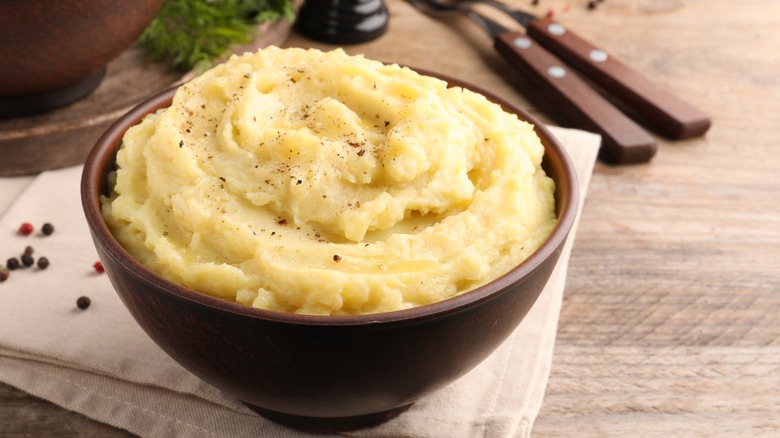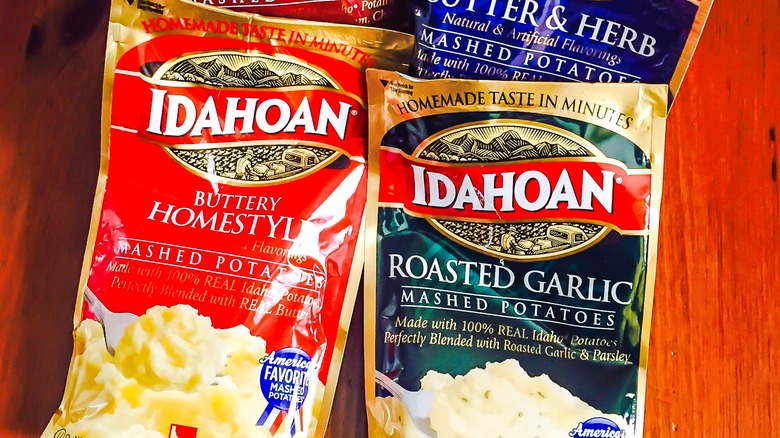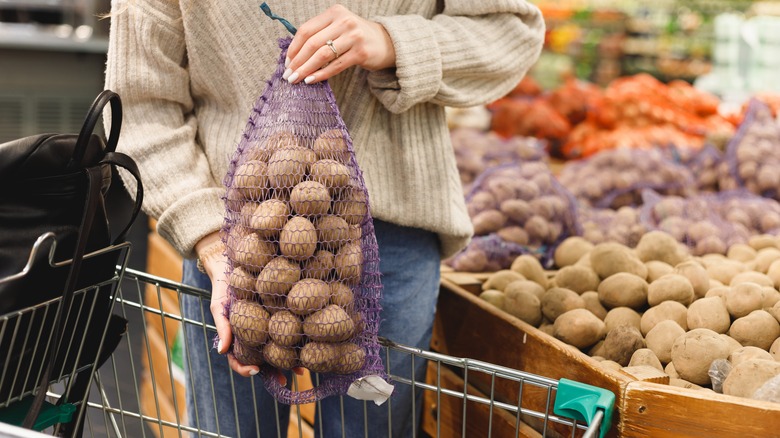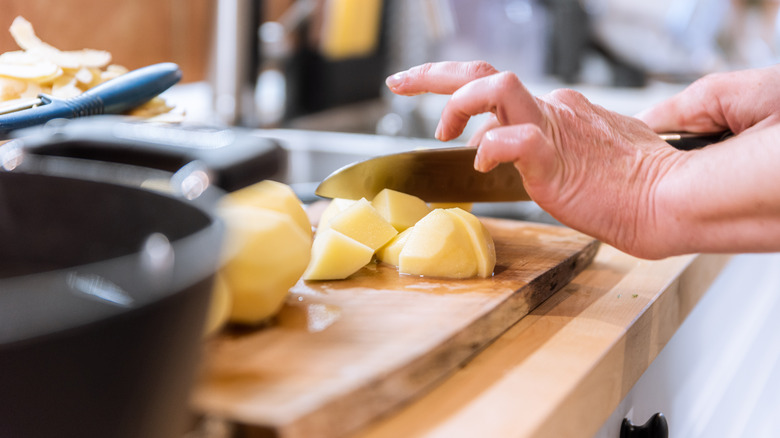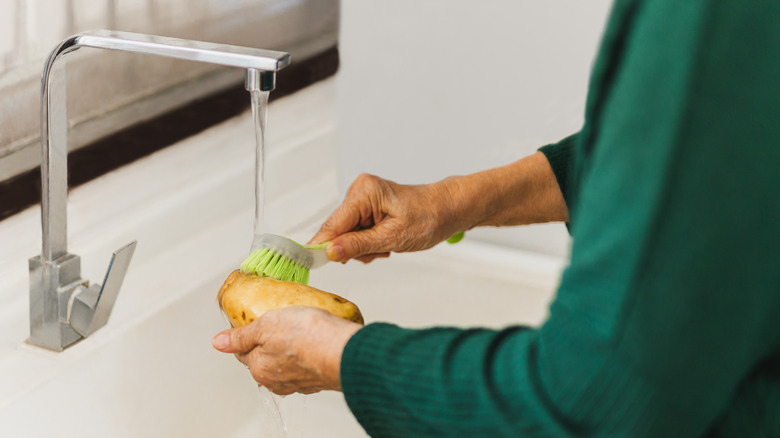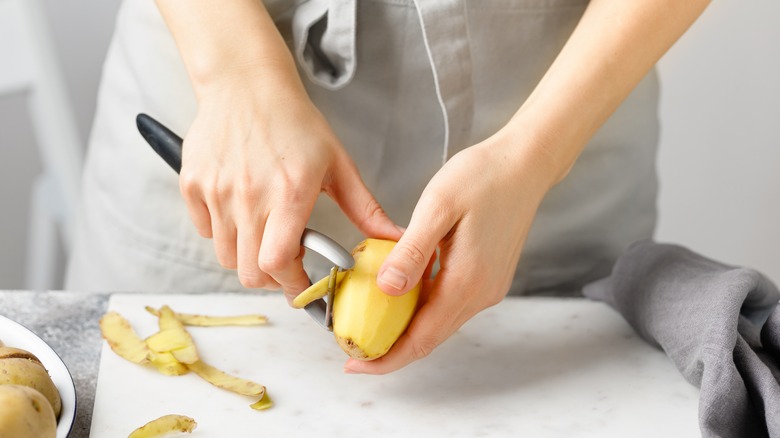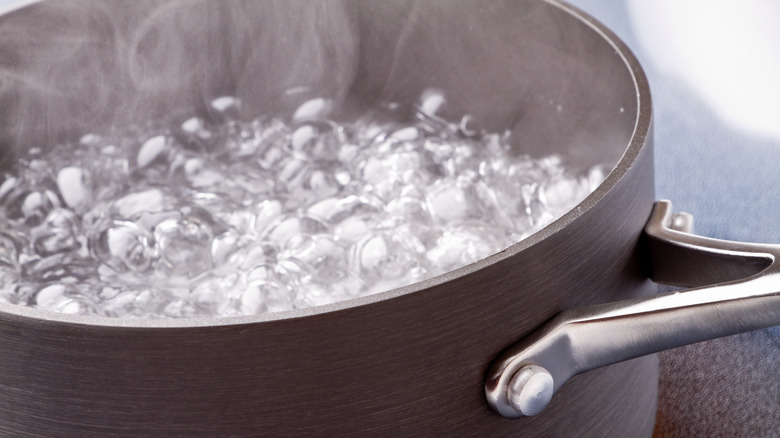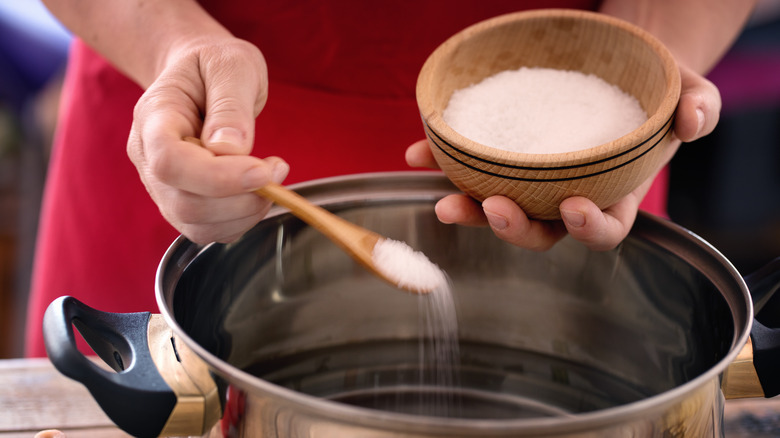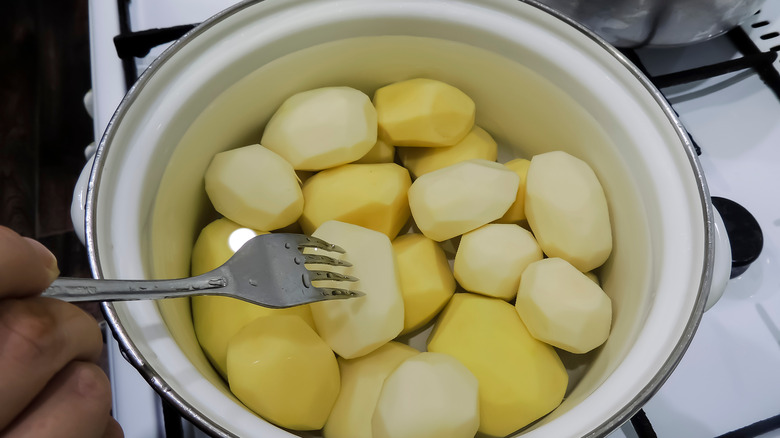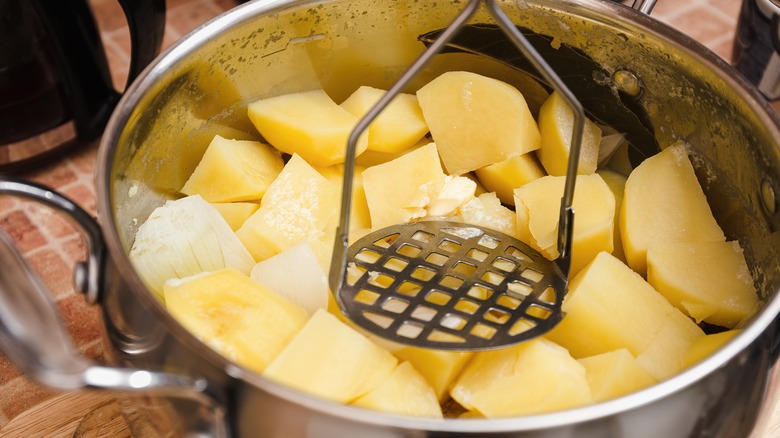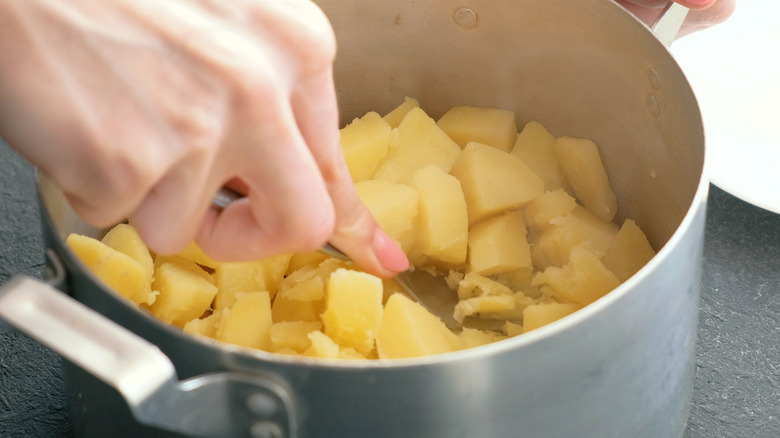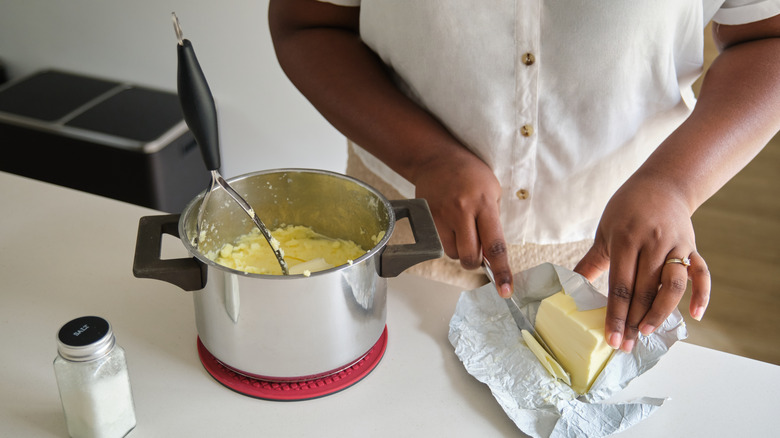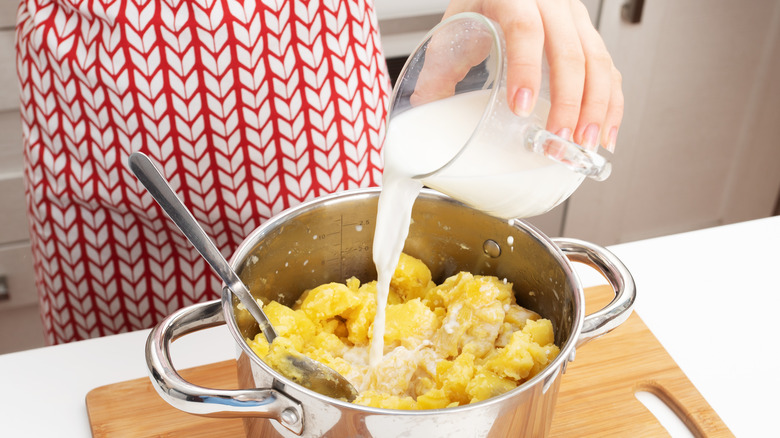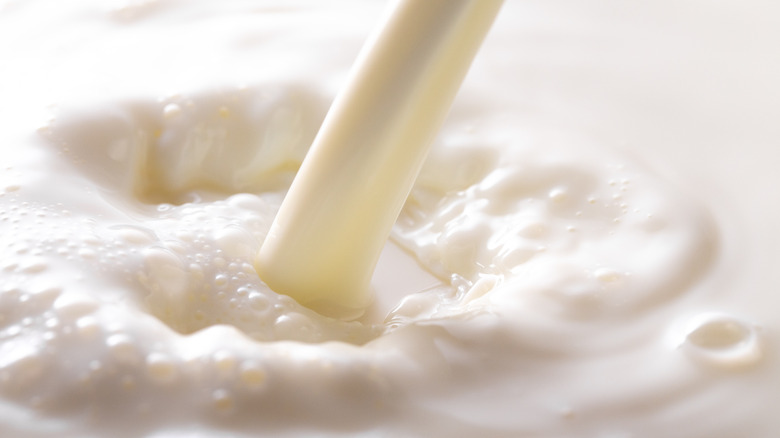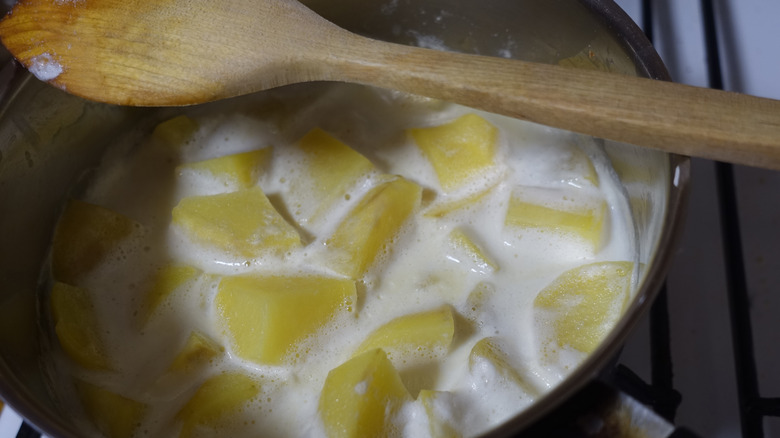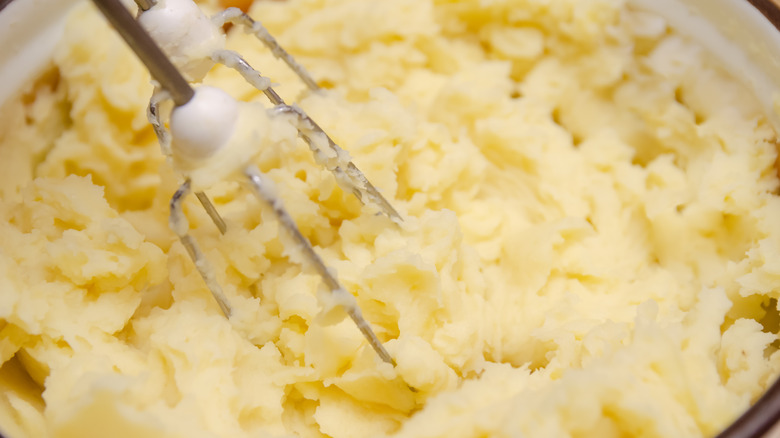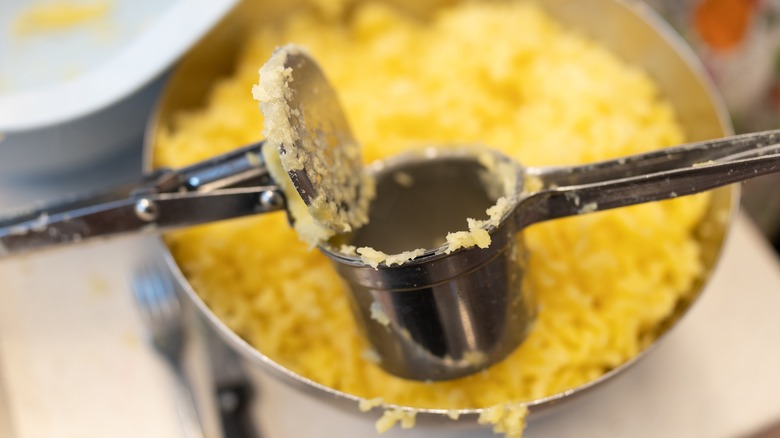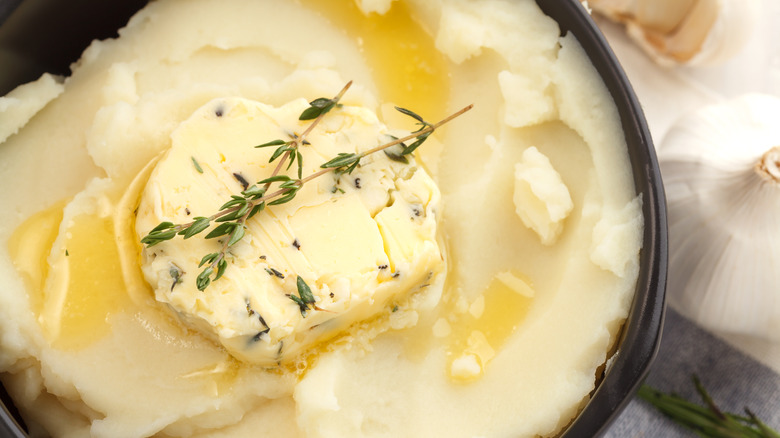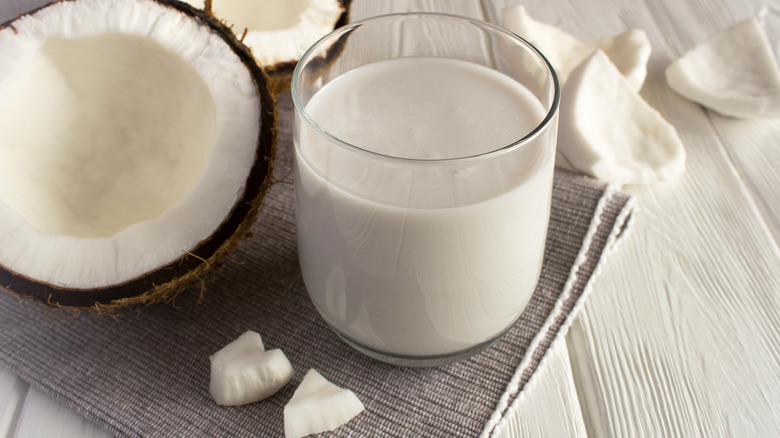18 Mistakes That Are Preventing You From Cooking Perfect Mashed Potatoes
When mashed potatoes are smooth, creamy, and flavorful, they can be the perfect addition to a meal. Whether you're hosting Thanksgiving dinner and serving them with the turkey and gravy, plating them beneath some beef stroganoff, or using them to top a shepherd's pie, mashed potatoes have the potential to add something truly magical to your overall dining experience. However, while preparing mashed potatoes may not seem like rocket science, some common mistakes can trip many people up. Making one of these mistakes can strip away that potential of a magical dining experience, leaving you with cold, lumpy, soupy, or flavorless mashed potatoes on your plate.
Before worrying that you'll never be able to unlock the secret of preparing smooth, creamy, and delicious mashed potatoes, breathe. We're here to help. In the next few sections, we'll share some of the most common mistakes people make when preparing this dish and explain how you can avoid them as well.
1. Making instant potatoes
Opting to use instant potatoes instead of making fresh mashed potatoes from scratch is a recipe for disaster. Sure, something is appealing about cutting down your prep time on a busy night, but potatoes from a box can't rival the taste of expertly prepared mashed potatoes.
Plus, you won't be saving yourself as much time as you may think. Instant potatoes are not instant. You still need to wait for the water to boil and mix in other ingredients. By the time you do that, you could be well on your way to making homemade mashed potatoes.
2. Not starting with the right type of potato
You probably already know to avoid using sprouted potatoes or green potatoes. However, you might not know that certain potato varieties are better suited for making mashed potatoes than others. Generally speaking, starchier potatoes, such as Yukon gold or russet potatoes, work better than waxy potatoes.
This is because starchy potatoes have an airier texture and lower moisture content. This combination means they'll break down better when cooking and mashing and won't turn into a liquid mess. Conversely, if you use red bliss, fingerling, or other waxy varieties, you may end up disappointed when your mashed potatoes turn out overly lumpy.
3. Improperly cutting the potatoes
When you make mashed potatoes, do you cut them into tiny pieces so that they'll cook faster? Or, do you just slice them up without giving a second thought to what size the pieces are or if they are even remotely the same width? These are both mistakes you don't want to make.
When preparing mashed potatoes, it is essential to cut the potatoes evenly. Otherwise, they won't cook at the same rate, leaving some pieces overly mushy while others are still hard. You'll end up with lumpy potatoes with this combination. On the other hand, if you cut them into too small pieces, the potatoes will absorb excess water when cooking, resulting in watery mashed potatoes. Instead, aim to cut the potatoes into evenly sized cubes. The exact size doesn't matter so much; just make sure they aren't overly tiny (under½-inch or so) and aim for around 1 to 2 inches.
4. Failing to wash the potatoes before peeling them
While you may assume that you don't need to wash potatoes if you're going to peel the skin off anyway, that would be a mistake. According to the CDC, you should always wash fruits and vegetables before eating or cooking them. Unwashed potato skins are full of germs and bacteria from growing in the dirt and being transported. If you don't wash them first, you will likely end up transferring some of that bacteria from the skin to the interior as you peel.
Instead, get a vegetable brush and scrub the potatoes under running water for a few minutes. The short amount of time it takes too do it is so important for your health and that of anyone else you'll be serving.
5. Not peeling the potatoes
While leaving the potatoes unpeeled isn't always a mistake, it is if you want your mashed potatoes to turn out creamy and fluffy. Leaving the skins on the potatoes saves time, but it will also alter the texture of the mashed potatoes.
The skin will not break down as fully as the inside of the potato, so there will still be noticeable pieces of peel mixed in. This may result in a finished dish that is chunkier and a bit denser than you prefer. It's a good idea to prep ahead before peeling by submerging your potatoes in water. This maintains flavor and helps clean them.
6. Adding the potatoes to boiling water
It can be confusing to figure out whether to add foods before or after water comes to a boil. While you should bring water to a boil before cooking pasta, the opposite is true when cooking mashed potatoes.
If the water is already boiling when you drop the potato pieces in, the outside will cook quicker than the inside. If you incorrectly assume they're cooked earlier than they are, you'll end up with a lumpy mess because the inside of the potatoes will still be hard. Instead, put the potatoes in cold water and let everything heat up together. This will allow them to cook more evenly and help you achieve the perfect mashed potato texture you want.
7. Forgetting to salt the water
Whether you honestly forget to salt the water or decide to omit the salt to lower the sodium content of the dish, you're making a mistake. Salt is a flavor enhancer, so failing to add it can leave you with bland potatoes.
To cook a large pot of potatoes, you'll need about 1 tablespoon of salt. Add the salt at the same time as the potatoes to maximize the flavor.
8. Under (or over) cooking the potatoes
Under-cooked potatoes will result in lumpy mashed potatoes. Over-cooking them isn't good, either. The potatoes will break down too much when you try to mash them, resulting in a liquid mess.
Unfortunately, there is no set time to cook potatoes as it can vary depending on how quickly the water is boiling and how large or small the chunks are. You'll need to check for doneness by cutting one of the pieces. They're done when you can cut through them easily with a knife. If there is still some resistance when you try to cut, they aren't entirely done yet. But, if they fall apart, then you've cooked them too long.
9. Letting the cooked potatoes cool before mixing
Another key to making perfectly smooth and creamy mashed potatoes is mixing all the ingredients together before the potatoes cool. Once they cool, they won't mix properly and help melt the butter that you should be adding to them. This will result in lumpier potatoes that won't taste right.
If you miss the window and can't mix all the ingredients immediately, you'll want to reheat the potatoes before mixing. Place them in a microwave-safe bowl with some water and warm them back up. Drain the water, then mash them promptly.
10. Not making sure the potatoes are dry enough to mash
While you don't want to let your potatoes sit out for too long, you should let them sit long enough for most of the water to dry. If the potatoes aren't given a few minutes to dry, they may add too much extra moisture to your finished recipe.
The drying process shouldn't take too long, so don't worry. After draining the cooked potatoes, return them to the pan for about five minutes. As they sit, periodically rotate them to help more water drop off. Then, you can move on to mixing all of the ingredients together.
11. Not adding enough butter
Mashed potatoes are meant to be smooth, creamy, and buttery. If you skimp on the butter, it will be impossible to achieve this perfect combination.
At a minimum, you'll want to use roughly two sticks of butter for 2 to 3 pounds of potatoes. Always taste the finished product to make sure it is to your liking before serving the recipe. Here's one more quick tip about the butter: Always mix it with the potatoes before stirring in the milk. It will cover the starch and help everything turn out richer and creamier.
12. Not heating up the milk, cream, or butter before adding them
One of the most common mistakes people make when preparing mashed potatoes is taking the milk or cream out of the fridge and pouring it into the bowl. If you use cold milk, the potatoes won't absorb it as well, decreasing the creaminess of the finished product. Moreover, cold milk will cause the dish to cool down more quickly, making it less appetizing for your guests. Heat the milk on a stove or in the microwave before adding it to your mixing bowl.
Butter, too, should be warmed up. Just as butter temperature matters when baking, it also matters for mashed potatoes. If the butter is too cold, it will not properly melt into the mixture. This means you'll be left with an uneven distribution of flavors and lots of little butter clumps.
13. Opting for low-fat milk
Whole milk, or ideally cream, is ideal when making mashed potatoes. Their higher fat content will make the resulting mashed potatoes extra creamy and delicious.
Skim milk has a fat content of less than half a percent. Compare that to the 3.25% fat content of whole milk, the over 10% fat content of half-and-half, and the over 35% fat content of heavy cream, and it should be easy to see why skim milk just won't be able to yield very creamy mashed potatoes.
14. Making the potatoes too thin
Mashed potatoes should be smooth but not thin or runny, and there are a few different mistakes that can leave you with thin mashed potatoes. We've already covered some of these, including using the wrong type of potatoes or cutting them into very tiny pieces before cooking.
One further mistake that can result in thin and runny potatoes is adding too much milk or cream to the mixture. You must be very careful when pouring milk into the bowl and only add a little at a time. Stir after each addition and pay close attention to the consistency before adding more.
15. Overmixing the potatoes
You may think that the more you mix your potatoes the smoother they'll become. Unfortunately, this just isn't the case. Overmixing potatoes can result in a sticky and gummy finished recipe.
The reason behind this is that the more you mix the potatoes, the more starch they release. If too much starch gets released, you wi be left with a gummy gunk. Mash until the potatoes are smooth, but stop mixing to maintain that perfect texture.
16. Using the wrong tool to mash the potatoes
If you want your mashed potatoes to turn out just right, then you must select the right tool to mash them with. You might think that the mixing power of a blender or food processor will be ideal for breaking down the potatoes and getting them creamy, but don't do it. As noted above, overmixing will result in gummy potatoes, and overmixing is almost inevitable if you use a tool as powerful as a blender or food processor.
Instead, try using a potato ricer. It will break down and smooth out the potatoes nicely but will prevent them from getting overmixed and gummy.
17. Leaving out herbs and seasonings
Salt isn't the only thing you should add to your mashed potatoes if you want them to be flavorful. Don't be afraid to add herbs and seasonings to upgrade your dining experience and make the dish worthy of being served in a fancy restaurant.
There are so many different herbs and seasonings you can experiment with until you find that perfect combination for your taste buds. Some ideas include fresh garlic, rosemary, parsley, sage, oregano, and pepper. You could even add some French onion soup mix to your next batch to increase the flavor.
18. Not considering dairy alternatives
While butter and whole milk or cream should be your go-to in most cases, there are exceptions to this rule. Namely, if your host friends or family cannot have dairy due to food allergies or other dietary restrictions, you should look for alternatives that are safe for them. The last thing you want to do is to exclude one of your guests from being able to partake in the meal you are serving.
Fortunately, you can still make delicious mashed potatoes with some of the many substitutes. To start, look for vegan butter. With its plant-based ingredients, it is dairy-free but still has higher levels of oils to help replicate the creaminess and fat content of real butter. For the milk, try using a mix of almond milk and coconut milk. Coconut milk has a thicker texture that will mimic that of cream or whole milk.
